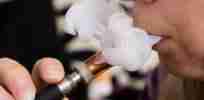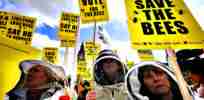Cosmos
Articles written for the GLP list the source as Genes and Science. All other articles were written for the sources noted with excerpts provided by the GLP.
Video: Sperm are ‘spinners not swimmers’—because they are lopsided
Research by fertility scientists in the UK and Mexico challenges the accepted view of how sperm “swim”, suggesting that it ...
‘Mind blindness’ makes it hard to remember the past and picture the future
[R]ecent studies have found that 2% to 5% of people will see nothing at all [when they try to imagine ...
Invading armies not to blame for fall of ancient Andean cultures, genetic analysis shows
An international team has conducted what it says is the first in-depth, wide-scale study of the genomic history of ancient ...
‘Stealth’ technology could mean universal blood transfusions—regardless of blood type
Scientists have created a “stealth” red blood cell that camouflages its immune status, meaning it could potentially be transfused into ...

Malfunctioning brain ‘hubs’ could be responsible for dyslexia, ADHD
Different learning difficulties do not, as previously thought, correspond to specific regions of the brain, new British research suggests. Instead, ...

Evidence mounts that marijuana smokers more vulnerable to false memories
Cannabis not only induces forgetfulness, it also opens the door for false memories, according to new research. And that’s serious, ...
Is your personality shaped by your gut bacteria? Study suggests sociable people have more diverse microbiome
A new study from Oxford University, published in the journal Human Microbiome, has linked gut bacteria strains and diversity with people’s personalities. That ...
Reforestation: Climate change solution or ‘ecosystem disservice’? Depends where you plant the trees
Reforestation is an important part of tackling climate change, but it seems we need to think carefully about where we ...
Electrical stimulation can ‘starve’ brain cancers, early study shows
Researchers have shown that electrical stimulation to the skull can starve brain cancers of vital nutrient-rich blood, opening the door ...
‘Cancer lab’ on a chip could move diagnosis into our homes
Finding out you have cancer is bad enough, but to then have to go to hospital for a painful and ...
Another mystery of our brains: ‘Why are we not hallucinating all the time?’
It’s a question they might have asked for different reasons in the ’60s, but neuroscientists from Stanford University in the ...
Forget batteries and wires. Can we build robots out of synthetic DNA?
It's long been a dream of many to build robots that look and act like humans. After all, there's a ...

International group of economists, geneticists calls for relaxed crop gene-editing rules to promote food security
With renewed attention to implementation and regulation, new plant breeding technologies such as gene editing could make an important contribution ...
New study claims first farmers in Europe were direct descendants of region’s hunter-gatherers, challenging belief migrants introduced agriculture
For several years it has been broadly acknowledged that agriculture in Europe was first established in the Anatolian peninsula in modern day ...
‘Second genesis’: Assessing the evidence for life on Mars
Today, the burning question isn’t whether Mars might once have been habitable – at various times in its distant past, ...
Genetic analysis reveals mysterious evolution of brewer’s yeast that makes beer possible
The strain of brewers’ yeast used to make beer, Saccharomyces cerevisiae, derives from versions used over thousands of years to ...
Can frequent exercise epigenetically slow the aging process?
Research under way in Melbourne is showing that exercise can, literally, make your body younger. … [Researcher Sarah] Voisin tells ...
Searching for keys to cancer resistance in the genome of giant tortoise Lonesome George
An international research team has discovered several variants in tortoise genomes that potentially affect six of the nine hallmarks of ...
Human, Neanderthal mating was more than just a ‘one night stand’, study suggests
Once upon a time, prehistoric humans and our ancient Neanderthal cousins met and procreated. Except, that ‘once upon a time’ ...
Why Darwin’s ‘abominable mystery’ may not be all that mysterious
For 140 years, scientists have been trying to explain what Charles Darwin described as “an abominable mystery”. Darwin was bothered by evidence ...
Nothing to fear from hallucinations linked to macular degeneration, study shows
Hallucinations linked to vision loss from macular degeneration are caused by abnormally heightened activity in the visual cortex of the ...
‘Cradles of diversification’: Lagoons played key role in evolution of first vertebrates
Scientists have discovered that shallow, lagoon-like environments were the cradle for vertebrate evolution, giving rise to our distant ancestors. A ...
Controversial study: Humans were in Madagascar 6,000 years earlier than previously thought
The butchered remains of extinct elephant birds could push back the date of human habitation of Madagascar by 6,000 years, according ...

Poppy genome reveals ‘bizarre’ biological errors that gave us ‘intoxicating medicines’
A series of bizarre events and biological errors over evolutionary history were responsible for the intoxicating medicines found inside the ...
From dinosaur to bird: How did the transformation take place?
[I]n Bavaria, the Jurassic-aged limestone deposits yielded a near-perfect fossil of Archaeopteryx. It had blade-like serrated teeth and many other features ...
Here’s why we now believe Neanderthals were able to create fire
New research shows that Neanderthals were able to start fires using stone tools. The findings, published in the journal Scientific Reports, present ...
Medical marijuana and pain control: Study casts doubt on drug’s effectiveness
Depending on who you listen to, medical cannabis is either a rising star in the world of therapeutics or an ...

233 scientists call on world’s governments to ‘greatly restrict’ use of neonicotinoid insecticides to protect biodiversity
Continued applications of the most widely used insecticides in the world must be urgently restricted, say 233 scientists in a tightly ...

